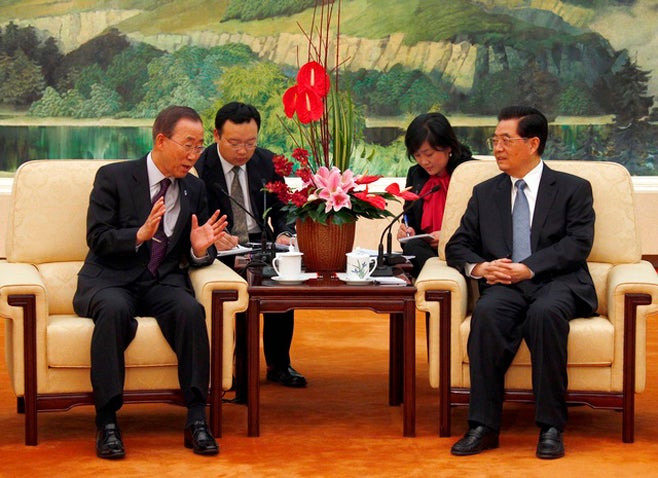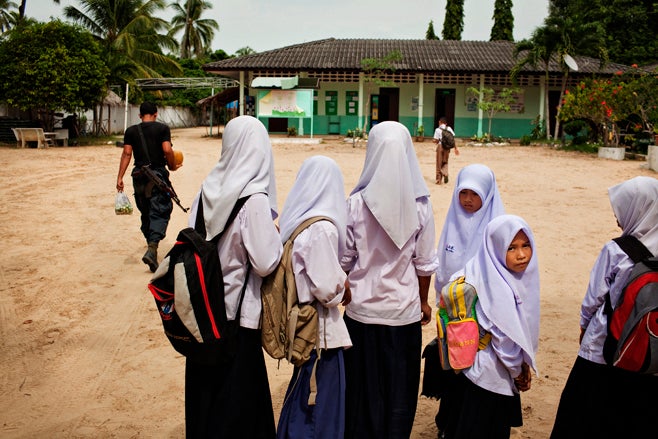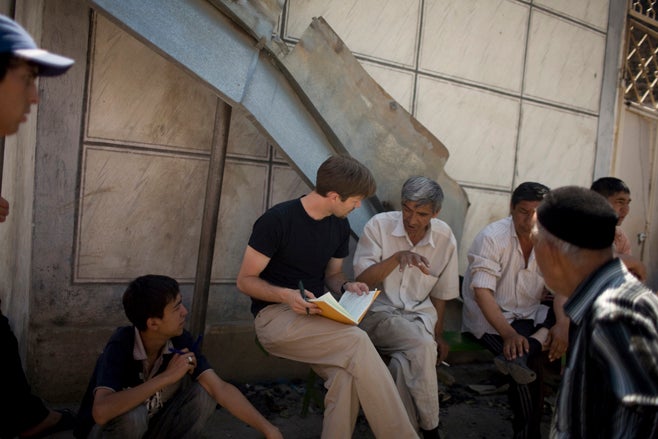India, the world's most populous democracy, has a vibrant media, active civil society, a respected judiciary, and significant human rights problems.
The government's agenda in 2010 was dominated by continuing insurgency and armed conflict in several regions, including Jammu and Kashmir, Maoist-afflicted areas in central India, and Manipur and other parts of the volatile northeast. Impunity for abuses committed by security forces in the context of these conflicts remains a pressing concern.
Authorities made little progress in reforming the police; improving healthcare, education, and food security for millions still struggling for subsistence; ending discrimination against Dalits ("untouchables"), tribal groups, and religious minorities; and protecting the rights of women and children.
In many parts of the country, communities protested forcible acquisition of land by state governments for infrastructure and mining projects. These projects frequently go ahead without proper safeguards to protect the rights of those at risk of displacement.
Legislators and officials proposed new laws to prevent torture, ensure food security, and prosecute those responsible for sexual violence, but have yet to repeal laws providing effective immunity from prosecution to government officials, including soldiers and police, responsible for human rights violations.
Accountability for Security Force Abuses
The security forces have at times used excessive force in suppressing violent street protests in Indian-administered Kashmir; the clashes resulting in more than 100 deaths and thousands of injuries to both civilians and security forces. Deaths and injuries to protesters, many of them children, prompted anger and renewed protests, deepening a cycle of tit-for-tat violence. In September the government sought to calm tempers by announcing dialogue, releasing arrested protesters, and providing financial compensation for deaths.
Maoist insurgents (Naxalites), operating in seven states, killed more than 100 police and paramilitary personnel in 2010, prompting a massive government security response. Civilians were often caught up in the fighting.
In Manipur, conflicting separatist demands by rival groups led to repeated unrest, with the security forces continuing to operate under the Armed Forces Special Powers Act (AFSPA). Separatist groups and security forces committed serious abuses against civilians; no members of the security forces were held accountable.
Activists in all of the conflict areas and in major cities demanded repeal of the AFSPA and a larger commitment by officials to holding security forces accountable for abuse, but repeal efforts were stymied by opposition from the army and extreme nationalist political parties.
Bombings and Other Attacks
Prosecutors made some progress in 2010 in pursuing justice for a series of bombings targeting civilians that killed 152 persons in 2008, responsibility for which was claimed by an Islamist militant group called Indian Mujahedin (IM). Police have charged more than 70 alleged IM members or associates from nine states in the 2008 attacks and continue to seek the arrest of more than three dozen fugitives. The IM is also suspected in a February 2010 attack in Pune city that claimed 17 lives and has apparently claimed responsibility for a September attack that injured two foreign tourists in New Delhi.
There were repeated allegations of unlawful detention, torture, and other ill-treatment by police to secure confessions in response to such attacks. In several cases, the police themselves appear to have drafted the confessions. The suspects suffered further abuses while in jail awaiting trial and even in court.
On an encouraging note, the trial of Ajmal Kasab, the sole surviving Pakistani gunman in the November 2008 Mumbai attack that claimed 166 lives, was conducted in a professional manner and was not the summary proceeding that critics had feared.
Police in 2010 reported that extremist Hindu groups may have been responsible for bombing attacks in Ajmer and Hyderabad, prompting the Home Minister to warn against these previously ignored militant groups.
Other Accountability Issues
Impunity for abusive policing remains a pressing concern in India, with continuing allegations in 2010 of police brutality, extrajudicial killings, and torture. While some policemen were prosecuted for human rights abuses, legal hurdles to prosecution remained in place and long-promised police reforms remained in draft form or unimplemented. Alleged perpetrators use political influence, corruption, and intimidation to obstruct investigations, delay proceedings, discourage plaintiffs, and ultimately escape prosecution.
The long backlog and slow progress of cases in India's courts also discourages potential complainants. Victims' family members and human rights lawyers needed several years, for example, to force an investigation into allegations that the Gujarat police summarily executed four persons in 2004. Only after the Supreme Court ordered the Central Bureau of Investigation to investigate the summary execution of an alleged terrorist in 2005 were a state minister and several senior Gujarat police officials arrested.
The government has yet to prosecute those responsible for the mass killings of Sikhs that followed the 1984 assassination of Prime Minister Indira Gandhi by her Sikh bodyguards. Delivery of justice for mass violence against Muslims in Mumbai in 1992-93 and in Gujarat in 2002 has been slow.
In a positive development, a legislator from the ultra-nationalist Bharatiya Janata Party was convicted in June 2010 for his role in violence against Christians in Orissa in 2008 that left at least 40 people dead and thousands displaced when a Hindu mob attacked Christians. In August, 16 others were sentenced to three years in prison for their role in the violence.
Women's Rights
While many serious issues remain, Indian officials took some positive steps on women's rights in 2010. In March long-awaited legislation reserving seats for women in parliament was passed by the upper house and awaits lower house approval. In April authorities introduced nationwide guidelines for maternal death investigations and introduced a separate mechanism to track pregnancies and their outcomes.
"Honor" killings of women and girls continued in 2010, mostly in the northern states of Haryana, Punjab, and Uttar Pradesh. Khap panchayats (unofficial village councils) issued edicts condemning couples for marrying outside their caste or religion and censured marriages within a gotra (kinship group) as incestuous even though there was no biological connection. To enforce these decrees, family members threatened couples, filed false cases of abduction, and killed spouses to protect the family's "honor." Some local politicians and officials were sympathetic to the councils' edicts, implicitly supporting the violence.
India still lacks comprehensive legislation on sexual violence and child sexual abuse, but authorities in 2010 began to consider reforms to the existing sexual violence law. Among a host of other problems, rape survivors continue to suffer from use of an unscientific and degrading "finger test" in many hospitals to determine whether they are "habituated" to sexual intercourse; the findings of the test can be used in rape cases and other criminal proceedings.
Children's Rights
In Jammu and Kashmir, several children were among those killed or injured during anti-government demonstrations. Children detained for alleged participation in the violent protests were held in jail with adults, in violation of juvenile justice laws.
Although the government issued a directive preventing security forces from occupying and using schools as long-term outposts during anti-Maoist operations in states such as Chhattisgarh, Bihar, and Jharkhand, it failed to effectively implement the measure, resulting in continued disruptions in education. Maoist insurgents continued to bomb government schools and to recruit children into armed combat. The government failed to effectively implement policies that provide for free and compulsory primary education.
Access to Pain Relief
Hundreds of thousands of persons with advanced cancer suffer unnecessarily from severe pain because the Indian government has failed to ensure access to safe, effective, and inexpensive pain drugs. More than half of government-supported regional cancer centers do not offer palliative care or pain management, even though more than 70 percent of their patients need it. Numerous patients told Human Rights Watch that their suffering from cancer and other conditions was so severe that they would rather die than live with the pain. The government also failed to integrate palliative care into HIV treatment programs.
Sexual Orientation and Gender Identity
Building on a 2009 decision of the Delhi High Court, government officials promised to drop section 377-a provision too often abused to treat consensual homosexual conduct between adults as a crime-in proposed amendments to the Penal Code.
India's Foreign Policy
Despite its considerable influence, India continues to miss opportunities to raise concerns about even egregious human rights violations in other countries or to assert leadership on human rights at the United Nations. In several cases, it has actively opposed international efforts to pressure human rights violators.
India played an important role in Afghanistan, providing aid for humanitarian and infrastructure projects. In July the Foreign Minister called on all parties to abjure violence, end links to terrorism, and accept the "democratic and pluralistic values of the Afghan Constitution, including women's rights."
After the conclusion of a Sri Lankan military campaign to defeat the Tamil Tigers in 2009, India provided humanitarian assistance for the rehabilitation of displaced persons and called for political reconciliation. India, however, has continued to be weak on accountability for atrocities committed during the conflict by both Sri Lankan and Tamil Tiger forces.
In July India hosted a state visit by Burma's authoritarian leader, General Than Shwe. India failed to demand greater protection for human rights by the military junta, support an international commission of inquiry into war crimes in Burma, or condemn the deeply flawed processes and rules for Burma's national election held on November 7, 2010.
Relations with Pakistan remained tense, particularly when new evidence showed that Pakistani military intelligence officials may have been involved in supporting the Lashkar-e-Taiba attack in Mumbai in November 2008.
Key International Actors
India's policy in the subcontinent is heavily influenced by its strategic and economic concerns about China's growing influence in countries like Burma, Nepal, Pakistan, and Sri Lanka.
Relations between India and China suffered setbacks in 2010. China disapproves of India's continued support to Tibetan refugees and its hosting of the Tibetan government in exile. However, both China and India agreed to resolve differences through continued dialogue.
India continued to build strong ties with the United States and Europe, built on increasing trade and business opportunities. Both the US and EU insisted they privately pressed India to address a range of domestic rights concerns and to become more of a champion of human rights issues internationally. But there was no evidence such efforts resulted in changes in Indian policy or practice.



